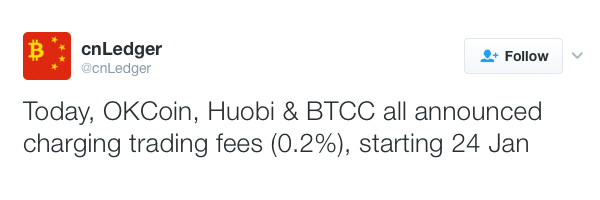In a surprising and sudden move, Trump has signed an executive order that enacts a complete ban of entry into America from citizens of seven countries: Iran, Iraq, Libya, Somalia, Sudan, Syria, and Yemen. Except for Iran, most of them are or have recently been war zones with three of the countries – Iran, Sudan and Syria – already on the US State Sponsors of Terrorism list.
Restrictions were expected as he promised them during his campaign, but the indiscriminate nature of the ban, combined with its initial application to green card holders, raised questions regarding Trump’s commitment to the rule of law, the competence of his team as well as increased uncertainty on the economy.
The backlash has been considerable, most notably from Silicon Valley. Sam Altman, the president of Y Combinator, called on the tech industry to stand up and they did. CEO after CEO, who in combination control companies worth trillions, contemned the indiscriminate ban. Mike Belshe, the CEO of Bitgo, joined the calls as did the Digital Currency Group and many other bitcoiners.
Our space, of course, is global. Bitcoin is used by Europeans, Arabs, Mexicans, Chinese, Russians, Africans, Americans and everyone in between. All of them are welcomed. The freedom of movement we enjoy, combined with its exchange of ideas, has been one secret ingredient that has given us much prosperity. It is by character we judge, not any other irrelevant quality. This principle has given us great strength with the best example being the welcoming of Einstein who considerably contributed towards the ending of the second world war.
Few, therefore, would find an indiscriminate ban acceptable. Would, for example, Malala Yousafzai, who stood up for women’s rights, be banned if she was born in Yemen? Would the next Einstein be banned even though he obviously poses no danger and might even give us great strength?
Increased Uncertainty
The inclusion of green card holders in the ban may indicate that some of the advice Trump is receiving is from incompetent individuals as the way this was implemented has placed his commitment to the rule of law in question and increased uncertainty regarding the way some of his other promises will be implemented.
In particular, some are now wondering whether he will actually really place a 45% tariff on Chinese goods, an act that may send the world economy down tanking. Reflecting the uncertainty, stocks are already down, the dollar is falling, while bitcoin has suddenly gone up by $40.
Bitcoin Rises Following Trump’s Travel Ban From Seven Countries
However, although Trump may be many things, stupid is unlikely to be one of them. The initial strictness of the order, regardless of whether one agrees or disagrees, is a textbook negotiation tactic. The quick removal of green card holders from the ban might make the rest slightly more acceptable. The initial complete ban might make the eventual probable loosening of the rules to take into account exceptions as a more acceptable end status quo.
Moreover, the target itself, despite wide opposition, is a somewhat soft pick to show to Mexico, China and perhaps even ISIS, that he actually means business. They, or any rational observer, can no longer be sure that the 45% tariff or any other of his statements are a negotiation tactic.
Still, a sudden tariff on China would have a very different response. Rather than open letters and some protests, the stock market would probably instantly crash and the economy he promised to make great again would return to recession or worse. As such, it remains very unlikely, but instead of just a negotiation tactic it can now be considered as a realistic threat.
To illustrate, he hasn’t yet said or done anything in regards to China where the economy is concerned, with the exception of repealing the Trans-Pacific Partnership. It is doubtful he will before meeting his Chinese counterpart for talks on how the relationship moves forward.
The Eleven Days of Trump
If we judge impartially, what Trump has done so far is largely in line with what he has promised. For our space in particular, he has frozen any new regulations pending review and signed an order requiring the repealing of two regulations for any one enacted by federal agencies. He has set up a new system to fast-track infrastructure projects as well as imposed a lifetime ban on administration officials lobbying foreign governments and a five-year ban on other types of lobbying.
He did sign an order for the wall, delivering on that promise, even though many, including some of his supporters, do not agree with the building of an actual wall. America could, instead, have a Marshall plan for Mexico, its own neighbor, as it worked perfectly well for Europe.
Most controversially, the indiscriminate nature of the ban is surprising, but it appears to have less to do with immigration or Muslims in general and more to do with perhaps ending this 15 years long war we have been fighting that has cost around three million lives in Afghanistan, Syria and Iraq, including the lives of thousands of Americans, both soldiers and civilians, as well as many European, not to mention the trillions dollar cost.
Towards that end, Trump has signed an order requiring a plan within 30 days to defeat ISIS. The plan should include “recommended changes to any United States rules of engagement.” It does sound terrible and it probably is. Nor do we know whether it would work. If it doesn’t, it would most probably cost him the presidency and his reputation.
Bitcoin, the Hedge
Considering the complicated task that Trump faces, from Mexico to China, Europe, Russia and Arabia, bitcoin may continue to attract attention as an easier means of wealth storage and transportation, but Trump shouldn’t be underestimated. He withstood the opposition of the entire media, all of the establishment and even the revolt of his own party during the election campaign and still rose to be the most powerful man in the world mainly because he retained the support of his base and attracted the support of independents.
Retaining such support now may be more difficult as there is no other candidate for comparison, leaving his actions to be judged solely on their own merits. As such, he can scarcely afford shambles like the blanket ban which may benefit bitcoin, but does little to persuade independents who may now be on the fence, waiting for the picture to become slightly more clear. Until it does, bitcoin may rise as Trump continues his first 100 days in power, but, depending on his future statements or actions, it may be a temporary reaction.
Disclaimer: The views expressed in the article are solely that of the author and do not represent those of, nor should they be attributed to CCN.
Image from Shutterstock.
Alternative Money Fund® A Crypto Currency Hedge Fund "Specializing in Returning Freedom and Value",™ Inquiry: 10biteye@gmail.com (Alt Money Fund®)
Tuesday, January 31, 2017
Friday, January 27, 2017
Man buys house with Bitcoin, lucks into a $1.3M profit
While Bitcoin has starred in a series of horror stories about wasted retirement funds andlost fortunes due to its notorious unpredictability, one man from California lucked out big time on his recent house purchase – and all thanks to the popular cryptocurrency.
Speaking to Bloomberg Markets, Bitpay CCO Sonny Singh told an intriguing story how Bitcoin’s volatility accidentally helped the buyer in question take home a profit of approximately $1.3 million during the exchange from the cryptocurrency to American dollars.
Singh and his company were recently approached by a real estate developer that received an offer from a prospective buyer who expressed a preference to pay in Bitcoin. After walking him through the peculiarities of the transaction, the two parties eventually reached an agreement for the estate, which was valued at around $4 million at the time.
But here’s the thing: While the cryptocurrency was worth a mere $750 when the transaction was originally initiated, by the end of the transfer Bitcoin had surged up to over $1000, earning him a profit of more than a million dollars.
“The buyer actually ended up making about 25 percent in the currency exchange rate, essentially, in the appreciation,” Singh said. “He got a house for pretty much 25 percent cheaper.”
While the cryptocurrency continues to remain on the verge of mainstream adoption due to its highly unstable rates, the technology is gradually starting to make its way to the masses. Not too long ago, Japan became one of the first countries to introduce a service that allows users to pay their utility bills in Bitcoin.
Sunday, January 22, 2017
Bitcoin’s “Bad Boy” Brand Name Here To Stay
The New York State Department of Financial Services (DFS) reaffirms that bitcoin is an “official” US name for virtual currency. Incidentally, many find the name Bitcoin an “unattractive” brand name. Indeed, some have been calling for replacing its name, and its differing logos, to prevent Bitcoin’s demise. Critics also point out that Bitcoin still lacks a proper currency symbol.
Nevertheless, defying marketing orthodoxy, Bitcoin outperformed fiat currencies for two years in a row.
Issues with the Bitcoin Brand Name

New York State Department of Financial Services (DFS) just approved Coinbase as a virtual currency and a money transmitter. In the respective press release of January 17, 2017, DFS explicitly refers to bitcoin, without capitalization, when referring to virtual currency, “Coinbase, which is subject to ongoing supervision by DFS, offers services for buying, selling, sending, receiving, and storing bitcoin.”
Bitcoin with capitalization refers to the concept or the network itself.
Good branding is a crucial tool, by which consumers identify and differentiate a product. The purpose of a brand name is also to attract and hold loyal consumers. Bad branding, on the other hand, leaves consumers unresponsive to the product or just turns them away.
Brand name changes are often in the news. For example, Google changed to Alphabet, and Phillip Morris became Altria.
Most recently, Yahoo Inc. announced that part of Yahoo is changing its name. The new name is Altaba. According to CNBC, “Experts say the renamed company could be a way for Yahoo to shake off its recent problems, with two data breaches affecting a total of 1.5 billion user accounts in 2016, as well as being a requirement of the deal.”
Many feel uneasy with the Bitcoin name, and some have even been calling for a new name.
Guy Lepage, Partner at Blockstack, wrote an article entitled “Bitcoin has a brand problem,” in November 2015. In it, Lepage specified a list of reasons supporting his call to rename Bitcoin.
One of Lepage’s many objections is the name. “Plastic coins. The term evokes imagery of plastic coins from your childhood. This is a great example of what not to do when naming a product or technology. A little marketing research at the naming stage would have raised awareness that the finance industry takes their money very seriously and having a fun, playful name does not appeal to this audience.”
Lepage’s article concludes with an appeal to have the Bitcoin name changed. Otherwise, Lepage predicts, “I fear without this change, it could be another 10 years before this network really takes off — if at all.”
Bitcoin’s Logo versus Bitcoin’s Currency Symbol
 Bitboy, a Bitcoin Forum user, claims to be the author of the logo, which is an inclined, bold capital letter serif B, traversed by two vertical lines.
Bitboy, a Bitcoin Forum user, claims to be the author of the logo, which is an inclined, bold capital letter serif B, traversed by two vertical lines.
Granted, the Bitcoin logo it is not a designer’s. It is not stylish or elegant. The logo does not convey all that Bitcoin represents.
Most importantly, Bitcoin is not a company, product or brand to have a logo, says Melissa Volkmann, Lead Designer, HashRabbit Inc.
Besides, Bitcoin’s logo is not a currency symbol, points out bitcoinsymbol.org. “Currencies are represented by symbols like $, € or ¥, aiming to be used everywhere by everybody.”
In October 2015, Ken Shirriff submitted a proposal to Unicode, to have the currency symbols, the serif capital B with the two vertical strokes, added to the standard. As a result, in November 2015, Unicoderecommended its integration into the Unicode standard. However, as Bitcoin.com reported in July 2016, the Unicode standard, version 9.0, excluded the Bitcoin’s currency symbol.
Even if Bitcoin’s currency symbol is eventually included in the Unicode standard, Bitcoinsymbol.org dismisses U+20BF and demands the Unicode character U+0243, Ƀ instead.

The bitcoinsymbol.org project’s primary objective is to find the right symbol for Bitcoin. You can participate and share your ideas about this project here.
Microsoft Will Support Bitcoin

The good news is that Microsoft will soon include a Bitcoin symbol in its Excel Accounting and Currency formats.
“In 2017, Excel will be able to recognize, format, calculate, and analyze numbers expressed in Bitcoin currency. The new feature will be available for Excel running under Windows 10, Android, Mac OS, and iOS, and will include Excel Mobile versions as well,” says Martin Butler, Account Executive, Globals at Microsoft.
Office Watch expects Microsoft to use the Unicode character Ƀ.
Nevertheless, regardless of its unmarketable brand name or logo, and the fact that it lacks an official currency symbol, Bitcoin, thanks to its inherent virtues, is the most successful cryptocurrency. Indeed, as reflected by its performance, and ever-greater adoption rates, Bitcoin is on the path to becoming a prominent world currency.
What are your thoughts about changing the Bitcoin name or logo? Let us know in the comments below.
Images courtesy of Shutterstock, Creative Commons, and Ecogex.
Do you want to vote on important Bitcoin issues? Bitcoin.com has acquired Bitcoinocracy, and rebranded the project to Vote.bitcoin.com. Users simply sign a statement with a non-empty Bitcoin address and express their opinions. The project focuses on determining truth backed by monetary value and transparency.
QE and Capital Controls Create Worldwide Demand for Bitcoin
Bitcoin had an incredible run in 2016, finally breaking $1,000 USD on New Year’s Day 2017. Many people are curious to find out why significant amounts of money found its way into the bitcoin economy over the past year. Two of the biggest reasons that are spurring bitcoin demand worldwide are bitcoin’s censorship resistance and it’s store of value attributes.
The global economy is going through significant changes and tumultuous times. Because traditional markets are failing globally, people have been searching for a financial escape and economic safe haven. Bitcoin has filled the role of currency and store of value that is helping people worldwide. These needs have attributed to the exponential demand bitcoin has seen over the past year.
Capital Controls Bolster Bitcoin Demand
 One notable aspect of the troubled global economy is the use of capital controls by individual countries. Capital controls are residency-based policies concerning the in-and-outflows of legal tender from capital markets. Many of these rules are applied to currency exchanges that limit the amount of wealth that can leave the country. Lately, certain countries have increased capital controls to try and save the country’s failing economy and devalued currencies.
One notable aspect of the troubled global economy is the use of capital controls by individual countries. Capital controls are residency-based policies concerning the in-and-outflows of legal tender from capital markets. Many of these rules are applied to currency exchanges that limit the amount of wealth that can leave the country. Lately, certain countries have increased capital controls to try and save the country’s failing economy and devalued currencies.
China, home to a large amount of participants within the bitcoin community, has tightened capital controls. On December 30, 2016, the People’s Bank of China (PBOC) imposed two new policies on capital outflow. The central bank now requires Chinese citizens and organizations to report all yuan transactions above 50,000 yuan (US$7,200). Furthermore, China’s State Administration of Foreign Exchange (SAFE) detailed that Chinese residents must also apply to SAFE’s committee before registering with a foreign currency exchange.
Capital controls limit people’s abilities to transfer wealth as they please. This has highlighted bitcoin’s censorship resistance. Over the past two years, the strictest capital control policies come from countries such as China, Mumbai, Cyprus, India, Russia, and Argentina. Curiously enough these countries’ citizens have been heavily involved in the bitcoin economy over the past two years. Localbitcoins’ volumes in such economies has seen all-time highs, showing significant bitcoin demand stemming from geopolitical monetary controls.
Devalued Sovereign Fiat Currencies Strengthen Bitcoin’s Store of Value
 Globally, bitcoin is being discussed as a recognized store of value and hedge against turbulent markets. News reports and many headlines over the past year have defined the digital asset as an economic safe haven. The reason for this is because bitcoin has increased in value significantly in contrast to every fiat currency worldwide. The devaluation of legal tender in certain countries has also showcased bitcoin’s ability to be a digital store of wealth. The ongoing quantitative easing (“QE”) orchestrated by governments and central bankers in the US and the EU is another powerful driving force for the demand of bitcoin worldwide, as more and more people start to understand how QE devalues their own holdings.
Globally, bitcoin is being discussed as a recognized store of value and hedge against turbulent markets. News reports and many headlines over the past year have defined the digital asset as an economic safe haven. The reason for this is because bitcoin has increased in value significantly in contrast to every fiat currency worldwide. The devaluation of legal tender in certain countries has also showcased bitcoin’s ability to be a digital store of wealth. The ongoing quantitative easing (“QE”) orchestrated by governments and central bankers in the US and the EU is another powerful driving force for the demand of bitcoin worldwide, as more and more people start to understand how QE devalues their own holdings.
Currency devaluation is slightly different than depreciation because it is an economic policy that officially lowers the value of the country’s fiat value across global exchange rates. A monetary authority imposes these fixed rates by referencing the value of a foreign currency. Currently the most devalued currencies across the globe are the Vietnamese Dong, the Chinese Renminbi, the Venezuelan Bolivar, and the British Pound. Of course as you may have guessed all of these countries have intensified bitcoin demand.
Devaluation makes people’s purchasing power less useful when using their country’s legal tender. It makes inflation grow and goods become more expensive. Because bitcoin has been a significant store of value nearly every year except for 2014 its popularity has increased quite a bit. Bitcoin has allowed global citizens to actually save money and see their purchasing power accrue remarkably.
Bitcoin: The 21st Century Safe Haven
 Bitcoin has a lot of benefits to why it’s useful but most likely the biggest reason is because it helps people escape monetary losses imposed by central authorities. It’s safe to assume that these financial restrictions will grow throughout many countries worldwide. This means bitcoin’s censorship resistant uses and its potential to remain a store of value will continue to entice many people. Bitcoin was born as an alternative to the central edicts of those trying to control the world’s wealth. As countries tighten their grips on their citizens, more people will try to escape the clutches of totalitarian financial regimes.
Bitcoin has a lot of benefits to why it’s useful but most likely the biggest reason is because it helps people escape monetary losses imposed by central authorities. It’s safe to assume that these financial restrictions will grow throughout many countries worldwide. This means bitcoin’s censorship resistant uses and its potential to remain a store of value will continue to entice many people. Bitcoin was born as an alternative to the central edicts of those trying to control the world’s wealth. As countries tighten their grips on their citizens, more people will try to escape the clutches of totalitarian financial regimes.
If citizens catch wind of the benefits decentralized digital assets offer, the obvious choice will be bitcoin.
What do you think about capital controls and devaluation causing people to find a safe haven in the bitcoin economy? Let us know in the comments below.
Images courtesy of Shutterstock, Pixabay, and Crypto-graphics.com
Have you seen our new widget service? It allows anyone to embed informative Bitcoin.com widgets on their website. They’re pretty cool and you can customize by size and color. The widgets include price-only, price and graph, price and news, forum threads. There’s also a widget dedicated to our mining pool, displaying our hash power.
Big Changes Coming Within the Chinese Bitcoin Exchange Realm
There’s a lot of changes happening with Chinese bitcoin exchanges lately in light of the recent central bank inspections. Last week the top three exchanges within the region drastically changed margin lending services. Now more revelations have come to light as these companies plan on charging their customers trading fees starting at the end of January.
New Chinese Exchange Policies May Affect Markets
It seems after January 24, 2017, the top three Chinese bitcoin exchanges BTCC, OKcoin, and Huobi will becharging trading fees. The announcement comes after the People’s Bank of China (PBOC) began inspecting the exchanges and pledging new oversight. The most vocal company so far has been the BTCC exchange giving details to the public regularly.
“BTCChina, our CNY exchange, will start charging fees for bitcoin and litecoin trading from 12:00 PM (noon) UTC+8, Tuesday, January 24th,” explains BTCC during the recent trading fees announcement. “Market makers and takers will both be charged a flat fee of 0.2 percent per transaction. We are implementing fee-based trading to curb market manipulation and extreme volatility.”
Many Bitcoin community members are wondering how these new policies will affect the Chinese trading market. The new rules have a stark contrast to the years when Chinese exchanges operated with no trading fees and significantly sized margin lending practices. While BTCC’s newly implemented fees are pretty low, a lot of people are welcoming these new changes to the Chinese Bitcoin markets. One commenter on Reddit declares, “We are now witnessing a historic moment in Bitcoin, the end of the China casino era.”

Could Another Country Beat Chinese Volumes?
 Throughout the years China has dominated the trading market with vast volumes, but many questioned the numbers due to the exchanges lack of fees. With the new changes towards margin lending, and applying fees to trades, it may put China in a different position. Other countries are slowly rising to become the top dogs within the Bitcoin space.
Throughout the years China has dominated the trading market with vast volumes, but many questioned the numbers due to the exchanges lack of fees. With the new changes towards margin lending, and applying fees to trades, it may put China in a different position. Other countries are slowly rising to become the top dogs within the Bitcoin space.
For instance, Japanese trading volumes have exploded over the past few months as the country is now second in Bitcoin trading volume below China. Japan has focused steadily on capturing the Bitcoin and blockchain ecosystem and has definitely made its presence known over the past year. Companies like Bitflyer have positioned themselves as leading Bitcoin exchanges. Now the leading Japanese Internet company, GMO Internet Group is joining the Bitcoin exchange and wallet arena.
In Overcoming China’s Lead Trade Volume May Not Matter
China has gained a noteworthy head start when it comes to the digital currency and blockchain industry. The country has dominated in transaction volume, trading volumes, mining pools, and the manufacturing of mining equipment. Just one Chinese exchange has the lion’s share of the world’s Bitcoin trading volume compared to most global exchanges. However, some would tell you not to pay too much attention to Chinese trading volume as BTCC founder Bobby Lee once stated:
There is a lot of mining that goes on in China. However, I caution you: do not read too much into the high trading volumes. China has decent high volumes but unfortunately two of my competition exchanges — I never like saying this — but they are artificially inflating their volumes through the technique of wash trades. They use it for bragging purposes. They try to outdo each other. It’s not regulated yet so they don’t get slapped on the wrist for doing that.
It’s safe to say it will take some time before a serious contender comes into play. But it doesn’t mean China will dominate forever.
What do you think about the recent Chinese Bitcoin exchanges’ policy changes? Let us know in the comments below.
Images courtesy of Shutterstock, Twitter and Pixabay.
Bitcoin.com is ramping up our tools section with a variety of useful Bitcoin-related applications. There’s a price converter, paper wallet generator, a faucet, and a verifier to validate messages using the Bitcoin blockchain. We’re pretty excited to introduce these new widgets and tools so our visitors have the best resources to navigate the Bitcoin landscape.
Wednesday, January 18, 2017
Bitcoin: Why It Now Belongs in Every Portfolio
By Tuur Demeester
A technology is called “disruptive” if it creates a new market that first disturbs and then displaces an earlier technology. Bitcoin is
potentially such a technology and much more. The fact that it can disrupt the largest and most interconnected marketplace in the world—money, banking and finance—makes it perhaps the most promising investment opportunity of our age.
Unlike our current increasingly unstable and unpredictable financial system, Bitcoin has 21st century technologies at its very core.
The digital currency and clearing network is open source, mobile, peer-to-peer, cryptographically protected, privacy oriented and native to the internet. The fusion of these technologies allows for a level of security and efficiency unprecedented in the world of finance.
These are some of the areas in which Bitcoin-based technologies can directly compete:
- $2 trillion annual market for electronic payments.
- $1 trillion annual e-commerce market.
- $514 billion annual remittance market.
- $2.3 trillion hedge fund market.
- $7 trillion gold market.
- $4.5 trillion cash market.
- $16.7 trillion offshore deposit market.
Bitcoin’s potential is not going unnoticed. After it had been praised by tech moguls such as Bill Gates (“a technological tour de force”) and Gmail founder Paul Buchheit (“Bitcoin may be the TCP/IP of money”), the money started speaking. We saw investments in Bitcoin by top venture capital brass such as Marc Andreessen, Reid Hoffman, Fred Wilson and PayPal cofounder Peter Thiel; by billionaires such as Jeffrey Skoll (eBay cofounder) and Li Ka-shing (by all reports the richest person in Asia); by iconic executives such as Vikram Pandit (Citigroup), Blythe Masters (JPMorgan Chase) and Tom Glocer (Reuters); and most recently by large cap companies such as Google, Qualcomm, NYSE, Nasdaq, USAA (American bank and insurer) and NTT Docomo ($75b Japanese phone operator). Finally, several academic and government heavyweights have also affiliated themselves with Bitcoin companies: Larry Summers (ex-Treasury Secretary, World Bank Chief Economist), James Newsome (CFTC and NYMEX), and Arthur Levitt (SEC). The core value proposition of this network is the fact that, in the words of IBM executive architect Richard Brown, “Bitcoin is a very sophisticated, globally distributed asset ledger.” What Brown and others hint at is that Bitcoin will in the future be able to serve not only as a decentralized currency and payment platform, but also as the backbone for an “internet of property.”
This entails a decentralized global platform, smartphone-accessible, on which companies and individuals can issue, buy and sell stocks, bonds, commodities and a myriad of other financial assets. The effect will be to remove much of the current bureaucracy and barriers to entry, presenting a huge opportunity for the world’s 2.5 billion unbanked people.
Which raises the question: why Bitcoin, and not some other digital currency? The answer may lie in the network effect: of all the digital currencies, Bitcoin is the one with the highest adoption rate and the strongest security. The combined computing power of the Bitcoin mining industry serves as a protective firewall around the payment network. To give an idea of its size, as 21 Inc. CEO Balaji Srinivasan has pointed out, “All of Google today would represent less than one percent of mining.” In short: no other digital currency is as secure as Bitcoin. This attribute in itself attracts more capital, which in turn makes the network even more secure and performant.
Because of its robustness, the Bitcoin network is now the reference protocol for the new paradigm in finance. And just like TCP/IP became the mainstay for the internet of information, the Bitcoin network will likely become the value anchor for the internet of money and finance. Speed may be provided by offchain, lightning network, or sidechain transactions, but for the high-value transactions of tomorrow, Bitcoin could very well become the security-providing reference currency.
So, how much of all this potential is already realized? Well, from the inception of Bitcoin in 2009 until January 2011, its market cap grew to $1.5m. From there, it rocketed to $145m in January 2013, spiking to over $10 billion in January 2014, and after a two-year consolidation period, it recently regained that $10 billion market cap.
Despite significant price fluctuations, year-on-year adoption trends markedly point upward: as of Q1 2016, there were more than 13 million Bitcoin wallets (+60 percent), and the hashrate of the network was 1,028 pth/s (+300 percent).
Enticed by its great potential, investments in the Bitcoin ecosystem are taking off rapidly. In 2013, little over 40 VC deals were made that raised a total of $96 million. That number nearly quadrupled over 2014, with $335 million invested. For 2015, despite a softening VC climate, Bitcoin and blockchain startups raised a total of $490 million, an increase of 46 percent.
The value of bitcoins in circulation has been rising steadily. This can be explained mostly by the fact that it is a scarce commodity (maximum supply is 21 million) with rapidly growing utility. Here are a few possible scenarios for the future value of one bitcoin:
The scenarios projected above are, of course, not cast in stone. Bitcoin faces several risks going forward. These include:
- The emergence of a much better digital currency that steals its market lead.
- An undetected bug in the system.
- A hard fork (what happens when some nodes in the network start running a Bitcoin software upgrade that is incompatible with previous versions) causing the Bitcoin payment network to split in two.
- A sustained attack by an organization with substantial financial resources, such as a government.
How serious a risk do these challenges pose? Let us examine them.
A better currency is possible, but experience shows that disruptive protocols—such as SMTP for email and TCP/IP for internet—have proven to be very resilient once adopted by a critical mass of the population.
As with any software application, the discovery of bugs may destabilize the system, but the open-source nature of Bitcoin allows for many eyeballs to help track problems, and many brains to help figure out a solution.
A hard fork creates competition between two versions of Bitcoin, and after a period of fear and doubt, eventually the value will flow to the version deemed most useful by its users—not a long term threat in other words.
An organized attack on the network is possible but expensive, and there are many potential defense mechanisms: miners can refuse suspicious transactions or raise fees, vulnerabilities in the code can be fixed, and so forth. From the perspective of the government, approaching the robust, decentralized Bitcoin network with an outright ban is nigh impossible. Therefore taxation, regulation and acceptance seems the more likely outcome.
In any case, it seems exceedingly clear that the technology of the digital currencies is here to stay. Bitcoin does not appear to be a fad or bubble, nor merely a one-off hedge against gold. With a risk-reward proposition this attractive, holding a small percentage of bitcoins in one’s portfolio as a speculation on increased adoption may be one of the wisest investment decisions of our age.
1) Source: http://tinyurl.com/HFresearch2013
2) Source: http://tinyurl.com/argentine-USDcash
3) Source: http://tinyurl.com/GMabovegroundgoldstock
4) Source: http://tinyurl.com/worldbank2012remittances
5) Source: http://tinyurl.com/ecommerceglobal
6) Sources:http://tinyurl.com/VOXEUshadowecon and http://tinyurl.com/CIAworldGDP
7) Source: http://mises.org/content/nofed/chart.aspx
8) Source: http://tinyurl.com/HKMAoffshore
Tuur Demeester is founder of cryptocurrency-focused economic research firm Adamant Research and editor-in-chief of The Adamant Newsletter. He first discovered Bitcoin on a research trip to Argentina, and started recommending it as an investment at $5 in January 2012.
The views and opinions expressed herein are the views and opinions of the author and do not necessarily reflect those of The NASDAQ OMX Group, Inc.
Subscribe to:
Comments (Atom)